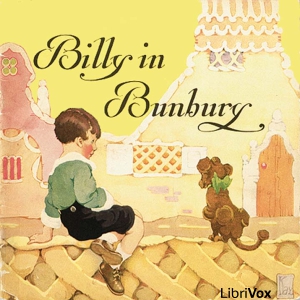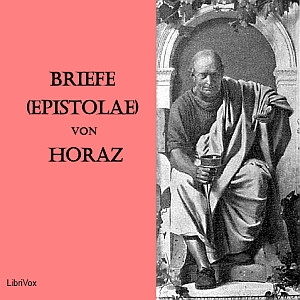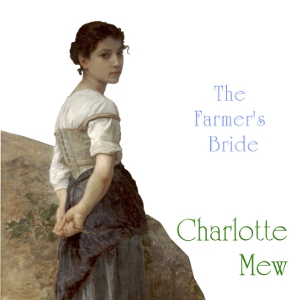LibriVox volunteers bring you 5 recordings of The World by Henry Vaughan. This was the Fortnightly Poetry project for July 26th, 2009.
5 episodes
LibriVox volunteers bring you 17 recordings of Business by Ambrose Bierce. This was the weekly poetry project for August 2nd, 2009.
17 episodes

L'Art d'être grand-père est un recueil de poèmes que Victor Hugo a publié en 1877. Suite à la mort de Charles Hugo, un de ses fils, et de sa femme, Victor Hugo prend en charge ses deux petits enfants Georges et Jeanne Hugo. Il écrit plusieurs poèmes illustrant les comportements et l'innocence reliée à ses petits-enfants qu'il élève seul et avec tendresse. (Résumé de Wikipédia) L'Art d'être grand-père ("The Art of Being a Grandfather") is a series of eighteen poems by Victor Hugo, published in 1877. They were among the last he wrote. On 13 March 1871, his 44-year-old son Charles died of a stroke, while riding in a carriage to a farewell dinner for some of Victor's friends at a restaurant in Bordeaux. Charles's wife died shortly afterwards, and Victor Hugo became the guardian of their children, Georges and Jeanne Hugo. The poems describe the feelings of a grandfather entrusted with innocent young children. Love and tenderness are celebrated, and the complexities, politics, and grand themes of his other poems are set aside. (Summary from Wikipedia)
68 episodes
LibriVox volunteers bring you 17 recordings of Gifts by James Thomson. This was the weekly poetry project for August 9th, 2009.
17 episodes
LibriVox volunteers bring you 8 recordings of Summer Morning by John Clare. This was the Fortnightly Poetry project for August 9th, 2009.
8 episodes
I sing the Song of Hiawatha,
Brave of heart and strong of arm.
Daughter's son of old Nokomis,
Fathered by the harsh West Wind.
With its regular, beating rhythm, the Song of Hiawatha has often been parodied, but in truth, it is a powerful, emotional epic; a hero's life, his loves and suffering. The legends and traditions of the North American Indian swirl together through the tale like a mountain stream, tumbling white over the rocks, and caressing the mossy tree roots.
(Summary by Peter Yearsley)
[introduction by Woodrow Morris]
23 episodes
LibriVox volunteers bring you 8 recordings of The House Where We Were Wed by Will Carleton. This was the fortnightly poetry project for August 23rd, 2009.
8 episodes
LibriVox volunteers bring you 10 recordings of A Channel Passage by Rupert Brooke. This was the weekly poetry project for August 30th, 2009.
10 episodes
This 1924 poem/recipe book, designed as promotional material for the Royal Baking Powder Company, is set in the Oz community of Bunbury. Little Billy, who won't eat, is taken to the delicious kingdom Bunbury by King Hun Bun to help whet his appetite. Meanwhile, the King leaves the boy's mother with a recipe book for treats, made easy by the use of Price's Baking Powder.
Written by Ruth Plumly Thompson, though neither her name, nor the illustrator’s (Gertrude Kay) appears on the book. (Summary by P. Cunningham)
2 episodes
LibriVox volunteers bring you 9 recordings of At Broad Ripple by James Whitcomb Riley. This was the fortnightly poetry project for September 6, 2009.
9 episodes
Pope’s Essay on Man, a masterpiece of concise summary in itself, can fairly be summed up as an optimistic enquiry into mankind’s place in the vast Chain of Being.
Each of the poem’s four Epistles takes a different perspective, presenting Man in relation to the universe, as individual, in society and, finally, tracing his prospects for achieving the goal of happiness.
In choosing stately rhyming couplets to explore his theme, Pope sometimes becomes obscure through compressing his language overmuch. By and large, the work is a triumphant exercise in philosophical poetry, communicating its broad and commonplace truths in superbly balanced phrases which remind us that Pope, alas, is one of the most quoted but least read writers in English:
“Hope springs eternal in the human breast: Man never is, but always To be Blest.”
(Summary by Martin Geeson)
5 episodes
LibriVox volunteers bring you 8 recordings of A Song of a Young Lady to Her Ancient Lover by John Wilmot. This was the Weekly Poetry project for September 6th, 2009.
8 episodes
LibriVox volunteers bring you eight recordings of In the Morning of Life by Thomas Moore. This was the Weekly Poetry project for September 13th, 2009.
8 episodes
LibriVox volunteers bring you 7 recordings of Adlestrop by Edward Thomas. This was the Weekly Poetry project for September 20th, 2009.
7 episodes
A János vitéz mára már klasszikussá vált Magyarország-szerte. Kukorica Jancsi történetével már általános iskolában megismerkednek a magyar diákok, de bármelyik korosztály számára élvezetes végigkövetni, ahogy az árva juhászból Tündérország királya lesz.
(Az ismertetőt írta: Majlinger Diána)
János Vitéz (Sir John) is a poem written in Hungarian by Sándor Petőfi. It has gained immense popularity in Hungary, and is today considered a classic of Hungarian literature.(Summary by Wikipedia)
7 episodes

Deutschland. Ein Wintermärchen ist ein satirisches Versepos des deutschen Dichters Heinrich Heine (1797–1856). Unzufrieden mit den politischen Verhältnissen im Deutschland der Restaurationszeit, die ihm als getauftem Juden keine Möglichkeit für eine juristische Tätigkeit bot, und um der Zensur zu entgehen, emigrierte Heine 1831 nach Frankreich. 1835 verbot ein Beschluss des deutschen Bundestags seine Schriften. Ende 1843 kehrt er noch einmal für wenige Wochen nach Deutschland zurück. Auf der Rückreise entstand der erste Entwurf zu „Deutschland. Ein Wintermärchen“. Heine verknüpft in dem Werk die Reisebeschreibung mit politischen und philosophischen Betrachtungen. In seinem unverwechselbarem Stil stellte er dabei seine „illegalen“ Gedanken in den Vordergrund, die er sozusagen versteckt als „Konterbande“, als Schmuggelgut, mit sich führe. Schon am 4. Oktober 1844 wurde das Buch in Preußen verboten und beschlagnahmt. Am 12. Dezember 1844 erließ König Friedrich Wilhelm IV. von Preußen einen Haftbefehl gegen Heine. Heines Versepos war bis in unsere Zeit hinein in Deutschland sehr umstritten. Vor allem im Jahrhundert seiner Entstehung betrachtete man das Werk als „Schandschrift“ eines Heimatlosen, eines „Vaterlandsverräters“, Miesmachers und Schandmauls. Diese Sichtweise von „Deutschland. ein Wintermärchen“ fand sich besonders in der Zeit des Nationalsozialismus bis ins dümmlich Groteske übersteigert. Die moderne Zeit sieht in Heines Werk ein bedeutendes politisches Gedicht in deutscher Sprache: souverän in seinem Witz, stark in seinen Bildern, meisterlich in seiner Sprachbeherrschung. (Zusammenfassung von Wikipedia)Germany: A Winter’s Tale is a satirical verse-epic or narrative by the famous German-Jewish author and poet Heinrich Heine (1797–1856). From the onset of the (Metternich) Restoration in Germany Heine was no longer secure from the state Censor, and in 1831 he migrated to France as an exile. (from Wikipedia)
6 episodes
LibriVox volunteers bring you 13 recordings of Lullaby by Louisa May Alcott. This was the Weekly Poetry project for October 4th, 2009.
13 episodes
LibriVox volunteers bring you 8 recordings of The Last Buccaneer by Thomas Babbington Macaulay. This was the Fortnightly Poetry project for October 4th, 2009.
8 episodes
Librivox volunteers from around the world bring you Christmas stories, carols and poems in English, German, Hungarian, Latin, Portuguese, Russian and Spanish.A merry Christmas to you all!
22 episodes
LibriVox volunteers bring you 19 recordings of Through the Wood by E. Nesbit. This was the Weekly Poetry project for October 11th, 2009.
19 episodes
LibriVox volunteers bring you 15 recordings of Parting by Charlotte Brontë. This was the Weekly Poetry project for October 25th, 2009.
15 episodes
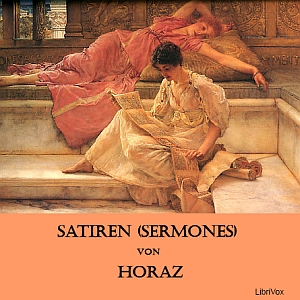
Veröffentlichung dieser Ausgabe 1893
Horaz, eigentlich Quintus Horatius Flaccus, ist neben Vergil einer der bedeutendsten römischen Dichter der „Augusteischen Zeit“, das heißt der Zeit zwischen 43 v. Chr. und 14 n. Chr., also vom Tod Ciceros bis zum Tod des Augustus.
Die zwei Bücher der Satiren bestehen aus zehn beziehungsweise acht teilweise recht umfangreichen Einzelgedichten in Hexametern. Horaz selbst nannte sie Sermones („Gespräche“). Er spricht darin mit Maecenas, mit dem Leser, mit sich selbst, und führt die Personen im Dialog vor. Ziel dieser nicht unbedingt harmlosen Plaudereien ist, dem Leser mit Humor die unangenehme Wahrheit aufzuzeigen. Vorbild war ihm der römische Satiriker Lucilius.
Horaz war stets um das Wesentliche und Straffheit bemüht. So lautete sein Kunstprinzip: Vielfalt in der Beschränktheit. Zentrales Thema ist die rechte Lebensgestaltung. Die meisten Gedichte geißeln Laster, die sozialen Unfrieden stiften oder zumindest die menschlichen Beziehungen beeinträchtigen, wie zum Beispiel: Habgier, Ehebruch, Aberglaube, Schlemmerei ... Im Gegensatz zu Lucilius, der schonungslos hochgestellte Zeitgenossen anprangerte, musste sich Horaz in dieser Beziehung zurückhalten. Seine Ausfälle beschränkten sich auf verstorbene Personen, einflusslose Leute und stadtbekannte Außenseiter. Nicht selten stellte er stellvertretend für den Normalbürger auch sich selbst und seine Schwächen dar.
(Zusammenfassung von Wikipedia)
18 episodes
LibriVox volunteers bring you 16 recordings of The Explanation by Rudyard Kipling. This was the Weekly Poetry project for November 1st, 2009.
16 episodes
LibriVox volunteers bring you 17 recordings of We Have Been Friends Together by Caroline Norton. This was the Fortnightly Poetry project for November 1st, 2009.
17 episodes
Diese Sammlung ist ein Adventskalender und enthält für jeden Tag vom 1.-24. Dezember einen Text oder ein Gedicht. Viele haben einen Bezug zu Weihnachten oder zum Winter. (Summary by Sonja)
24 episodes
Balder Dead" is a beautiful epic poem by Matthew Arnold. It draws from Norse mythology to retell the story of the the death of Odin's son, Balder, instigated by the treacherous jealousy of Loki. (Summary by Nathan)
3 episodes
LibriVox volunteers bring you 20 recordings of The Soldier by Rupert Brooke. This poem was written, as the concluding part of a series of sonnets, on the outbreak of the First World War in 1914. Brooke, himself, died the following year on his way to a battle at Gallipoli.This was the Weekly Poetry project for November 8th, 2009.
20 episodes
Veröffentlichung dieser Ausgabe 1893
Horaz, eigentlich Quintus Horatius Flaccus, ist neben Vergil einer der bedeutendsten römischen Dichter der „Augusteischen Zeit.
Da die Oden nicht den erhofften Erfolg brachten, ließ Horaz ab 20 v. Chr. von der Lyrik ab und widmete sich dem ersten Buch der Epistulae („Episteln“). Zusammengesetzt aus 20 Briefgedichten in Hexametern, legte Horaz in diesem Buch seine Lebensphilosophie dar.
Im zweiten Buch der „Epistulae“ ab 13 v. Chr. betätigte sich Horaz als Literaturkritiker.
(Zusammenfassung von Wikipedia)
19 episodes
Some day an enterprising editor may find time to glean from the whole field of Canadian literature a representative collection of wit and humour. . . . The present little collection obviously makes no such ambitious claim. It embraces, however, what are believed to be representative examples of the work of some of our better-known writers, many of which will no doubt be quite familiar to Canadian readers, but perhaps none the less welcome on that account. (Summary from the Introduction)
9 episodes
LibriVox volunteers bring you 11 recordings of ’Tis the Last Rose of Summer by Sir Thomas Moore. This was the Fortnightly Poetry project for November 15th, 2009.
11 episodes
Nesta coleção, os voluntários do Librivox reuniram várias obras de autoras que escreveram em Língua Portuguesa. A literatura lusófona, do século XVII ao século XX, vem aqui representada por algumas de suas maiores escritoras. (Sumário por Leni)
20 episodes
LibriVox volunteers bring you 20 recordings of Winter by Robert Louis Stevenson. This was the Weekly Poetry project for November 22nd, 2009.
20 episodes
“The Sun to me is darkAnd silent as the Moon,When she deserts the nightHid in her vacant interlunar cave.”Milton composes his last extended work as a tragedy according to the classical Unities of Time, Place and Action. Nevertheless it “never was intended for the stage” and is here declaimed by a single reader.Samson the blinded captive, in company with the Chorus of friends and countrymen, receives his visitors on their varying missions and through them his violent story is vividly recalled. Then he is summoned to give a final demonstration of God-given strength to entertain the Philistines, his captors. Famously – and of course, offstage – his performance brings the house down. (Summary by Martin Geeson)
12 episodes
LibriVox volunteers bring you 17 recordings of In the Rain by William Wetmore Story. This was the Fortnightly Poetry project for November 29th, 2009.
17 episodes
LibriVox volunteers bring you 12 recordings of Music On Christmas Morning by Anne Bronte.
Published in the 1846 collection Poems By Currer, Ellis and Acton Bell under Anne's nom de plume 'Acton Bell'.
This was the Fortnightly Poetry project for November 29th, 2009.
12 episodes
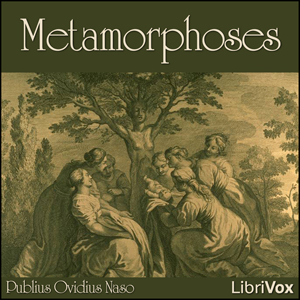
The Metamorphoses of Ovid is probably one of the best known, certainly one of the most influential works of the Ancient world. It consists of a narrative poem in fifteen books that describes the creation and history of the world through mythological tales, starting with a cosmogony and finishing with the deification of Julius Caesar. Published around 8 AD, the Metamorphoses are a source, sometimes the only source, for many of the most famous ancient myths, such as the stories of Daedalus and Icarus, Arachne or Narcisus. Ovid works his way through his subject matter often in an apparently arbitrary fashion; however, the connection between all the seemingly unconnected stories is that all of them talk about transformation. Change as the only permanent aspect of nature is the certainty that underlies the work of Ovid, who jumps from one transformation tale to another, sometimes retelling what had come to be seen as central events in the world of Greek myths and sometimes straying in odd directions. The poem is often called a mock-epic. It is written in dactylic hexameter, the form of the great heroic and nationalistic epic poems, both those of the ancient tradition (the Iliad and Odyssey) and of Ovid's own day (the Aeneid). It begins with the ritual "invocation of the muse," and makes use of traditional epithets and circumlocutions. But instead of following and extolling the deeds of a human hero, it leaps from story to story sometimes in very cunning ways, and, because of the clever ways in which it connects the stories, the Metamorphoses were once called the "Thousand and One Nights of the Ancient World". (Summary adapted from Wikipedia by Leni)
45 episodes
The pieces gathered into this volume were, with two exceptions, written for the entertainment of a private circle, without any view to publication. The editor would express her thanks to the writers, who, at her solicitation, have allowed them to be printed. They are published with the hope of aiding a work of charity,—the establishment of an Agency for the benefit of the poor in Cambridge,—to which the proceeds of the sale will be devoted. (Summary by Anne W. Abbot, ed)
34 episodes

Tristam & Iseult is a narrative poem containing strong romantic and tragic themes: and was first published in 1852 by Matthew Arnold. This poem draws upon the Tristam and Iseult legends: which were popular with contemporary readers.The poem opens with Tristam upon his deathbed. The monologue of the dying man is shot through with sharp pangs of regret: centering upon his induced passion for Iseult of Ireland - inflamed by his unwittingly imbibing an irresistible love-potion.Before his decease, Tristram's lawful wife - Iseult of Ireland - arrives in time to share his deathbed. Iseult of Brittany graciously accedes to their request to be buried near each other - in a splendidly-constructed mausoleum back in King Mark's Tyntagel (sic.) in Cornwall.Iseult of Brittany survives to raise Tristram's children in isolation. She forgives Tristam his adultery, and with delightful pathos is thankful for the short years of happiness that she spent espoused to one of King Arthur's most renowned knights. (Summary by Godsend)
4 episodes
LibriVox volunteers bring you 24 recordings of Velvet Shoes by Elinor Wylie. This was the Weekly Poetry project for December 6th, 2009.
24 episodes
LibriVox volunteers bring you 14 recordings of Lines by Percy Bysshe Shelley. This was the Weekly Poetry project for December 13th, 2009.
14 episodes
LibriVox volunteers bring you 21 recordings of Snow-Flakes by Henry Wadsworth Longfellow. This was the Weekly Poetry project for December 20th, 2009.
21 episodes

“Who ever lov’d, that lov’d not at first sight?”
The wonder-decade of the English drama was suddenly interrupted in 1592, when serious plague broke out in London, forcing the closure of the theatres. Leading playwrights took to penning languorously erotic poetry to make ends meet: so we have Venus and Adonis, The Rape of Lucrece - and Marlowe’s blazing masterpiece, Hero and Leander.
Marlowe’s poem became more notorious than either of Shakespeare’s, due not only to its homophile provocations but also to the scandal attaching to every aspect of Marlowe’s brief life, violently ended in a mysterious brawl, leaving the poem in an unfinished state.
The edition read here includes the wonderful continuation by George Chapman, a versatile playwright: tragedian as well as author of Jonsonian metropolitan comedies: in short, an all-round literary craftsman, whose Homer translation was famously admired by Keats. Chapman excels in extended allegory, but also in pithiest epigram –
“Love is a golden bubble, full of dreams,
That waking breaks, and fills us with extremes.”
All these playwrights come from the generation of grammar-school alumni raised on the secular curriculum of Latin poetry: above all, Ovid – the source of the story of Hero and Leander, and their “love-death” in the Hellespont.
(Summary by Martin Geeson)
16 episodes

The Tiruppavai is a collection of thirty stanzas (paasuram) in Tamil written by Andal, in praise of the God Tirumal or Vishnu. It is part of Divya Prabandha, a work of the twelve Alvars, and is important in Tamil literature. (Summary from Wikipedia)
ஆண்டாள் அருளிச்செய்தத் திருப்பாவை
பன்னிரண்டு ஆழ்வார்களில் ஒரே பெண் ஆழ்வாரான ஆண்டாள் (சூடிக்கொடுத்த சுடர்கொடி), திருமாலையே எண்ணி இயற்றிய இந்நூல் முப்பது பாசுரங்களைக் கொண்டது. பன்னிரண்டு ஆழ்வார்களின் தொகுப்பான திவ்யப்பிரபந்தத்தின் ஒரு முக்கியப் பகுதியாகவும், தமிழ் இலக்கியத்தில் மிக முக்கியமான நூலாகவும் இந்நூல் விளங்குகிறது.
திருமாலுக்கு உகந்த மாதமான மார்கழி மாதத்தில் அவருக்கு செய்வனவற்றைப் பக்தியுடன் செய்து வந்தால் அத்தனை அருளும் நம்மை வந்து சேரும் என்பது ஆண்டாளின் நம்பிக்கை. இதனால், காலையில் திருமாலை வேண்ட, உறங்கிக் கொண்டிருந்தத் தன் தோழிகளையும் இப்பாடல்களைப் பாடியே எழுப்பித் தன்னுடன் குளத்தில் குளிக்கவும், மலர்களைச் சேகரிக்கவும், மாலையாய்த் தொடுக்கவும், திருமாலைத் தரிசிக்கவும் அழைத்துச் சென்றார், ஆண்டாள்.
மார்கழி மாதத்தின் போது கன்னிப் பெண்கள் இன்னமும் இந்தப் பாடல்களைப் பாடித்தான் தனக்கு ஒரு நல்ல வாழ்க்கை அமைய வேண்டும் என்று வேண்டுகிறார்கள்.
(நீரு ஐயர் எழுதிய முகவுரை)
6 episodes
LibriVox volunteers bring you 13 recordings of The Spell of the Yukon by Robert W. Service. This was the Fortnightly Poetry project for December 27th, 2009.
13 episodes
LibriVox volunteers bring you 29 recordings of When You Are Old by William Butler Yeats. This was the Weekly Poetry project for January 3rd, 2010.
29 episodes
Jantje zag eens pruimen hangen, o! als eieren zo groot, 't Scheen, dat Jantje zou gaan plukken, schoon zijn vader 't hem verbood.’ ‘Daar alleen kan liefde woonen, daar alleen is 't leven zoet, Waar men, blij en ongedwongen, voor elkander alles doet.’ Twee citaten uit Proeve van Kleine Gedigten voor Kinderen. Van Alphen schreef voor zijn zonen drie dichtbundels (’Ziedaar, lieve wigtjes! Een bundel gedigtjes’) en gaf ze aanvankelijk anoniem uit. Deze bundels werden een groot succes, zijn tientallen malen herdrukt en zijn vertaald in het Frans, Duits, Engels, Fries en Maleis.Gelezen door: Bianca Kramer, Bart de Leeuw, Anna Simon en Peter Zinn.
3 episodes
LibriVox volunteers bring you 12 recordings of The Desert by Mathilde Blind. This was the Fortnightly Poetry project for January 10th, 2010.
12 episodes
LibriVox volunteers bring you 13 recordings of Summer Shower by Emily Dickinson. This was the Weekly Poetry project for January 10th, 2010.
13 episodes
LibriVox volunteers bring you 14 recordings of All Things Can Tempt Me by W. B. Yeats, from The Green Helmet and Other Poems (1912). This was the Weekly Poetry project for January 17th, 2010.
14 episodes
The Farmer's Bride is a collection of 28 poems by British modernist writer Charlotte Mew. The original edition was published in 1916; this edition, published in 1921, contains 11 more poems. Mew's poetry is varied in style and content, but manifests a concern with gender issues throughout. Mew's life was marked by loneliness and depression, and she eventually committed suicide. Her work earned her the admiration of her peers, including Virginia Woolf, who characterized her as "very good and quite unlike anyone else." (Summary by Elizabeth Klett)
2 episodes








